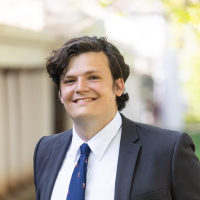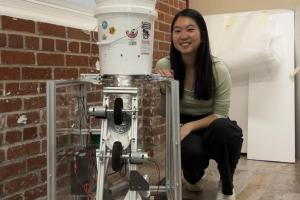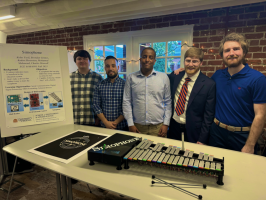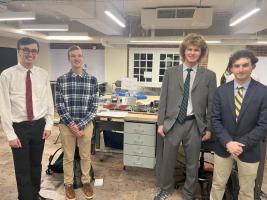Capstone
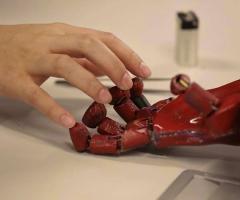
Capstone is where students use what they have learned in ECE to build real-world electronic prototypes. Students have built everything from digital graffiti boards to neural brain interfaces to self-playing xylophones. In a single semester, you will work with a group to go from idea to prototype and show off your team's work to alumni, current students, and faculty at the annual Capstone Fair.
What our students say about capstone
Zachary Yahn
Capstone is where the ECE curriculum comes together. I loved the flexibility to pursue any project that interested my team, and applying the various skills I learned from my ECE classes over the years easily made it one of the most fun classes I took at UVA. No other class I took could match it in hands-on work and real problem solving. It's certainly difficult but well worth every minute.
Sharon Lu
For our capstone project, my group made a pickleball training machine that had preprogrammed training routines and shot balls with different speeds, spins, and angles. I loved how this class was very open ended, allowing us to be really creative and integrate such a large mechanical component as well. We had a ton of fun demoing our project, launching balls around 30mph into a padded wall in the lab!
Past capstone winners
Fall 2023 winners: Simophone
An electronic xylophone that plays Simon Says.
Fall 2024 winners: Romulus I CPU
Our project revolved around the design and fabrication of a 16-bit CPU and supporting memory using Flash memory, 74XX series logic chips, and passive components. Aimed to be a educational device for students to learn computer architecture, digital logic, machine code, and electronics, the Romulus I is equipped with LEDs on the internal registers, 7-segment displays, debugging tools, and multiple clock speeds. The scope of this project also includes a compiled language and an assembler providing increasing layers of abstraction, allowing for either a top-down or bottom-up approach to teaching about computing systems and organization
More details about the capstone course
Capstone satisfies the ABET mandated Major Design Experience for Electrical and Computer Engineering students. It is one semester in duration and requires student teams to take a project from concept to "alpha-stage" prototype which is a very realistic industrial design cycle for the types of products that fall within the scope of this course. The final presentation and demo during a Capstone Fair at the end of the semester is well-attended by alumni, current students, and faculty.
Capstone addresses the following "big picture" goals through a number of specific learning objectives. At the conclusion of this course students should be able to:
- take a broadly-defined project, self selected and design, build, and test a solution that meets performance objectives.
- work effectively in teams and learn project organization.
- develop test plans and develop techniques for effective debugging.
- experience the joys and frustrations of developing a project.
- give effective presentations.
- write an engineering report that details their design solution, testing results, assembly techniques, constraints, engineering standards, and societal implications of their work.
Assessments will be based on class presentations, working project demonstrations, proposal and final report, and participation in concept inventory testing.
Images from our Fall 2023 Capstone Fair
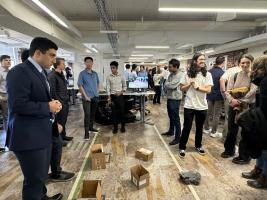
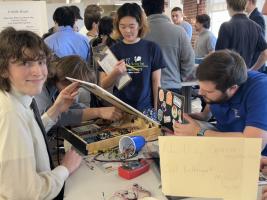

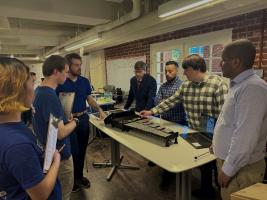
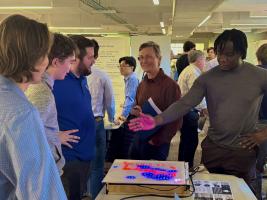
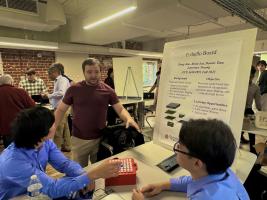
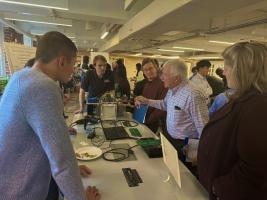
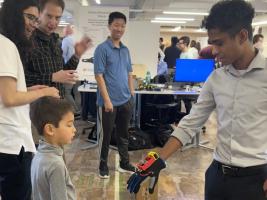
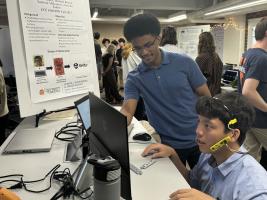
Questions about our capstone?

Adam Barnes
Adam Barnes earned a B.S. degree in Electrical Engineering from Virginia Tech in 1992, and an M.S. in Electrical Engineering in 1995. In 2019 he moved to the University of Virginia to teach the next generation of engineers. He is an ASEE member and interested in advancing engineering and science in both rising engineers and the general public.

Keith Williams
Williams' completed my Ph.D. in materials physics at Penn State University in 2001, and undertook postdoctoral research in the Molecular Biophysics Group at the Delft University of Technology in the Netherlands, thereafter establishing a nanophysics laboratory in the physics department at the University of Virginia.
